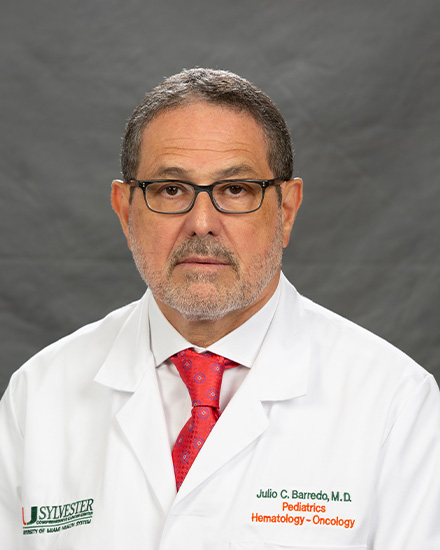Roles
Professor of Pediatrics, Medicine, and Biochemistry & Molecular Biology
Associate Chair for Clinical and Translational Research
Director, Children's Cancer Programs at UM Sylvester Comprehensive Cancer Center
Director, Division of Pediatric Hematology-Oncology
Toppel Family Endowed Chair in Pediatric Hematology-Oncology
Secondary Appointment of Biochemistry and Molecular Biology
-
Biography
Dr. Julio Barredo is a Professor of Pediatrics, Toppel Family Endowed Professor in Pediatric Hematology-Oncology, and Director of Pediatric Hematology-Oncology and Children's Cancer Programs at the University of Miami Sylvester Comprehensive Cancer Center. With over 30 years of medical experience, Dr. Barredo has dedicated his efforts and expertise toward cancer care and research in children, adolescents and young adults with hematological malignancies.
As a physician scientist, he focuses on Acute Lymphoblastic Leukemia, tumor metabolism and experimental therapeutics with an emphasis on investigating drug resistance and the development of new therapies for children, adolescents and young adults. He is a longstanding member of the Children’s Oncology Group and a member of the leadership group of the COG ALL committee. As a clinical investigator he has chaired national cooperative group protocols for relapsed/refractory ALL, as well as IITs translating discoveries from his laboratory to the clinic.
He has helped to raise millions of dollars for the UM Sylvester Cancer Center Pediatric Cancer Program and the Department of Pediatrics. His fundraising efforts has been key in bringing to life his brainchild, Alex’s Place, a new pediatric hematology-oncology and BMT outpatient clinic inaugurated in May 2012. The first facility of its kind in the nation and the first pediatric oncology clinic at Sylvester, Alex’s Place merges research and clinical care from an academic medical center with innovative technology designed to ease the anxiety of therapeutic visits. -
Education & Training
Education
Post Graduate Training
Licensures and Certifications
-
Honors & Awards
No result found
-
Teaching Interests
Dr. Barredo teaching efforts focus on the development of clinicians, physician scientists and basic scientist with interest in investigating the biology of pediatric cancers. He mentors undergraduate students, medical students, clinical residents and post-doctoral fellows, as well as graduate and PhD students. Several of his trainnees have become national/international leaders in their fields. -
Research Interests
Dr. Barredo is the Director of the program and a nationally and internationally recognized expert in pediatric acute lymphoblastic leukemia. He is a physician scientist with expertise in childhood leukemia and has led a funded laboratory program focusing on the development of novel therapies for childhood and adult acute lymphoblastic leukemia for 25 years. In the clinical realm, his expertise includes clinical trial design and implementation at UM, and within the Children’s Oncology Group, the national/international consortia TACL and Sunshine Project, as well as investigator initiated trials at SCCC. In that context, he has developed and chaired the last two national trials for children with extramedullary relapse of ALL (POG9412 and COG AALL02P2), a phase I trial of Panabinostat in pediatric patients and a phase I trial of metformin in combination with induction chemotherapy for ALL. H ALL, among other clinical research efforts. He collaborates with the adult leukemia team at SCCC in the care of adolescent and young adults with leukemia and lymphoma and within the SCCC AYA program he has recently developed a phase I trial of pevonedistat in combination with chemotherapy for AYA patients. His research laboratory conducts basic and translational research focusing on overcoming resistance in relapsed/refractory leukemia and his work has been funded through the years by NCI, Leukemia Lymphoma Society, other cancer research foundations and philanthropic organizations. It has also been a reference laboratory for POG/COG. The Barredo's lab group has focused on targeting metabolic pathways that are essential for cancer cell survival. Data from our laboratory in collaboration with the Evans laboratory (SJCRH) was the basis for the design and implementation of POG 9404, a clinical trial that led to a significant increase in EFS for patients with T-ALL and paved the way ofr more current therapeutic strategies in T-ALL. More recently our laboratory demonstrated that ALL cells exhibit heightened vulnerability to the induction of apoptotic death secondary to ER stress/ UPR mediated injury. We found that activated AMP protein kinase (AMPK) led modulation of the UPR in ALL cells under conditions of ER stress. More recently, we have uncovered that the NEDD8-activating enzyme inhibitor Pevonedistat® (MLN4924) effectively induces apoptosis in ALL cells in vitro and in vivo, and prolongs survival of NSG mice engrafted with human ALL cells. We found that Pevonedistat and other energy/metabolic stressors induced cell death via proteotxic/ER stress/UPR mechanisms and by re-balancing pro- and anti -apoptotic proteins in ALL cells in favor of cell death, and more important it exhibits a clear path for future translation into clinical trials for pediatric and adult patients with this disease. A current focus of his laboratory is to understand the epigenetic mechanisms that regulate ALL cell response to metabolic stress and has identified that AMPK plays a role in regulating the adaptation to metabolic/energy stress via epigenetic mechanisms. His lab has identified and is characterizing a multiprotein complex that binds to chromatin under metabolic/energy stress conditions to alter gene expression, and AMPK exerts a critical non-canonical role in this complex. Using exome sequencing, CHIPSeq and TurboID we are identifying protwin networks that allow cancer cells to survive under metabolic/energy stress, and these findings will lead to novel target and biomarker identification/validation for later translation into innovative clinical trials. -
Publications
Disclaimer: The information presented in this section has been consolidated using AI and machine learning technologies. While every effort has been made to ensure accuracy, errors may occur. If you identify any inaccuracies, please use this link to inform our data team. Your feedback is greatly appreciated and helps us improve the quality of our content.


